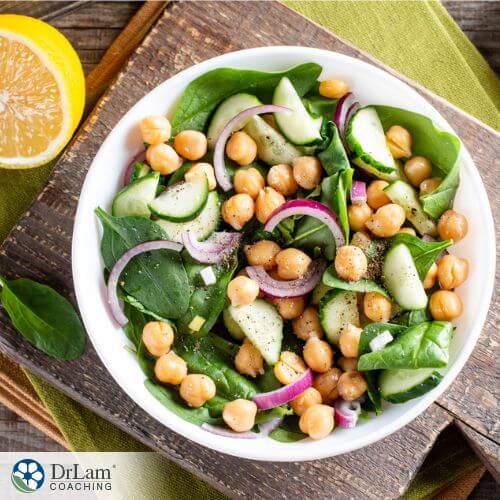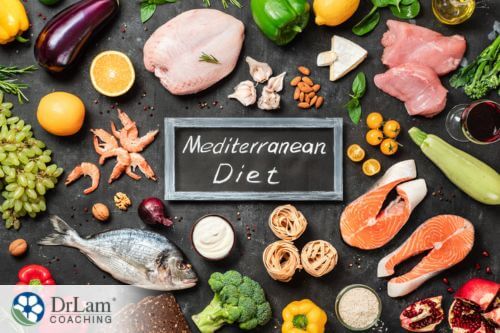 Whether you are on a weight loss journey, simply want to fuel your body the right way, or want to try something different for your personal well-being, trying healthy diet plans may help. The green Mediterranean diet, also known as the green Med diet, is growing in popularity and appears to have several health benefits. These include minimizing the risk of diabetes, cardiovascular disease, depression, and the development of visceral fat. We'll explore what it is, research on its benefits, and its pros and cons.
Whether you are on a weight loss journey, simply want to fuel your body the right way, or want to try something different for your personal well-being, trying healthy diet plans may help. The green Mediterranean diet, also known as the green Med diet, is growing in popularity and appears to have several health benefits. These include minimizing the risk of diabetes, cardiovascular disease, depression, and the development of visceral fat. We'll explore what it is, research on its benefits, and its pros and cons.
The idea of a green Mediterranean diet was first introduced in 2020. Researchers associated with DIRECT PLUS (Dietary Intervention Randomized Clinical Trial Polyphenols Unprocessed Study) came up with the concept. This diet emphasizes the greater inclusion of plant-based foods and limiting meat consumption. It's rich in color, fiber, omega-3 fats, and whole grains.
According to U.S. News and World Report, this diet was ranked as the overall healthiest diet of 2022. This diet eliminates red and processed meat altogether. Instead, plants are of central importance. However, it still includes traditionally “good” Mediterranean-style foods.
The green Mediterranean Diet is high in protein and limited in calories and carbohydrates. A day on this diet typically aims for roughly 1,500 calories for men and 1,200 to 1,400 calories for women. You'll usually start this diet with 40 grams of carbohydrates and 100 grams of protein. However, in your second month on this diet, you'll increase your carbohydrate intake to 80 g per day.
Additionally, some professionals recommend an exercise regimen that involved some form of physical activity five days a week to go along with the diet, depending on your health and goals.
Research findings suggest that the green Med diet has several health benefits, potentially because it is so high in polyphenols. Polyphenols are a potent compound found in plant matter that have strong anti-inflammatory and antioxidant benefits. Also, polyphenols have the potential to exert prebiotic effects in your gut. As such, they play a role in helping to maintain healthy gut bacteria in your body.
These benefits include:
This diet is structured in a way that promotes weight loss. It's a low-calorie model that encourages eliminating processed foods, sugars, and salty foods, in favor of plant-based, nutrient-rich whole foods.
In a Heart study that restricted participants to the same number of calories, participants on the green Mediterranean diet dropped an average of 14 lbs after six months. In contrast, those on the classic Mediterranean diet dropped 12 lbs. While the amount of weight loss was similar between both groups, those on the green Med diet lost more weight. Furthermore, men on the green Mediterranean diet lost more belly fat than males than those on the classic Med diet.
 Visceral fat can be described as belly fat that builds up deep inside the abdomen. This type of fat surrounds the organs, including the liver, pancreas, and kidneys. Excess build-up of visceral fat has the potential to lead to the development of conditions such as diabetes, heart disease, and dementia.
Visceral fat can be described as belly fat that builds up deep inside the abdomen. This type of fat surrounds the organs, including the liver, pancreas, and kidneys. Excess build-up of visceral fat has the potential to lead to the development of conditions such as diabetes, heart disease, and dementia.
Research indicates that the green Mediterranean diet can reduce visceral fat by as much as 14%.
Based on scientific findings, the polyphenols found in plant-based food varieties play a significant role in how well the green Mediterranean diet works to provide several benefits, including lowering visceral fat.
Polyphenols can trigger a more significant breakdown of fatty acids, as well as energy expenditure that could limit the level of fat accumulation. As such, adopting this healthy diet can help to decrease visceral fat and support your health and wellness overall.
Furthermore, it could help to promote weight loss in general. It achieves this through the polyphenols that help to prevent fat absorption after you eat and decrease chronic inflammation. Also, it prevents new blood vessels from turning into fat tissue, and it allows for greater glucose uptake into your muscles.
There are several varieties of food that contain high levels of polyphenols. These include:
The primary difference between the green Mediterranean diet and the classic Mediterranean diet is that red and processed meat is excluded from the green model, while the classic model allows the minimal consumption of these categories of food. Also, with the green Mediterranean diet, there’s a greater emphasis on plant-based proteins compared to the classic Mediterranean diet. Instead, it encourages the use of other animal protein sources and plant-based proteins, such as legumes, nuts, soy-based foods, and seeds.
Furthermore, these foods provide specific health benefits that are not found in animal-based foods. They are packed with antioxidants, dietary fiber, healthy fats, and a variety of vitamins and minerals.
Furthermore, the green Med diet promotes the daily intake of several high-polyphenol foods. These include green tea, Mankai duckweed (a high-protein aquatic plant), walnuts, olive oil, almonds, red onion, and broccoli. Duckweed is a good meat alternative because it's particularly rich in protein, iron, and vitamin B12.
Compared to the classic Med diet, the green Med diet has a more structured approach. There’s a specific limit on caloric and protein intake, and there are particular foods that you are supposed to eat every day. On the other hand, the classic Mediterranean diet does not limit what you can eat or the amount.
One thing that is common between the diets is that both include anti-inflammatory and antioxidant foods. However, the green Mediterranean diet appears to be more effective for the prevention and management of chronic diseases, due in part, to higher levels of polyphenols in the diet. It further provides greater cardiovascular and metabolic benefits as well.
 In one study, researchers assigned just under 300 persons with moderate obesity to one of three dietary groups: green Med diet, classic Mediterranean diet, and an ordinary healthy diet. Each group was given guidance on boosting physical activity as well.
In one study, researchers assigned just under 300 persons with moderate obesity to one of three dietary groups: green Med diet, classic Mediterranean diet, and an ordinary healthy diet. Each group was given guidance on boosting physical activity as well.
The research findings indicated that eating less meat while adding more plant-based, protein-rich foods into the diet could have a greater impact on boosting the cardiometabolic state. Also, they found that the green Mediterranean diet may decrease the risk of cardiovascular events to a greater degree than the classic Mediterranean diet.
In fact, the green Med diet showed better health effects than the other two diets. Group participants lost more weight on the green Med diet than on the other two diets. A total of 6.2 kilograms was lost on the green Med diet compared to 5.4 kilograms on the classic Med diet, and 1.5 kilograms on the healthy diet.
Additionally, waist circumference and LDL (low-density lipoprotein) cholesterol, also known as “bad” cholesterol, decreased more on the green Med diet more than on the other two diets.
Exercise is encouraged on the green Mediterranean diet. Moderate-intensity physical activity for at least 20 minutes a day for five days a week is generally recommended. Aerobic or cardio exercise is encouraged. Choose activities that you enjoy, be it jogging, running, biking, swimming, playing tennis, or hiking.
However, before you begin any exercise regimen, ensure that you speak to your doctor, especially if you have any health conditions.
As it stands, the green Mediterranean diet doesn’t seem to be linked to any health risks. However, this diet does require restricting calories while eating certain foods and eliminating others. This can lead to some drawbacks.
If you are a meat lover, the diet suggests avoiding red meat and processed foods. You'll need to eat more plant-based foods. Depending on what foods you have access to and your preferences, the diet can be hard to stick to long-term. Additionally, if you have to constantly remember that you have to avoid certain “bad” foods and focus on eating “good” foods, you may run into situations where you have cravings and periods of overeating.
Nuts are an essential part of the green Mediterranean diet. If you are allergic to any form of nuts, including almonds, chestnuts, hazelnuts, pine nuts, pistachios, and walnuts, this diet is out of the question. Don't risk it.
Another of the cons of the diet is readily finding a duckweed supplement. It's not widely available on the market, though it's a big part of the diet. It's not impossible to find, but it can be challenging.
If you are on any medication, consult with your doctor before including green tea in your daily diet. Green tea can interact with certain medications, making them less or more effective.
This diet is not necessarily a good choice for everyone, including those who are underweight, have a history of disordered eating, and those who are pregnant or nursing. Furthermore, if you have certain health issues such as adrenal fatigue, it is important to talk to your doctor before trying a restrictive diet such as this. Restrictive diets may not provide enough nutrients or calories to meet your energy needs in this case, and cause a worsening of the condition.
 The green Mediterranean diet could prove beneficial in addressing chronic conditions. Adrenal Fatigue Syndrome (AFS) is caused by chronic stress. AFS results in the overuse of the NeuroEndoMetabolic (NEM) stress response. Under stress, the adrenals produce more cortisol, the stress hormone, to meet the growing demand. However, this only works short term. Under long-term stress, the adrenals become exhausted, and cortisol output eventually decreases.
The green Mediterranean diet could prove beneficial in addressing chronic conditions. Adrenal Fatigue Syndrome (AFS) is caused by chronic stress. AFS results in the overuse of the NeuroEndoMetabolic (NEM) stress response. Under stress, the adrenals produce more cortisol, the stress hormone, to meet the growing demand. However, this only works short term. Under long-term stress, the adrenals become exhausted, and cortisol output eventually decreases.
The NEM stress response involves several other, related organs and systems, called circuits, that help manage stress. However, under chronic stress, many of these circuits also develop symptoms. The Bioenergetic Circuit (made up of the thyroid, pancreas, and liver) is responsible for producing the energy your body needs to function. Cortisol imbalances lead to a decline in metabolic functioning.
It can cause the body to go into panic mode and store calories as fat instead of burning them. As the body runs out of energy to deal with stressors, it can also lead to fatigue and cravings for unhealthy foods to boost energy, but that ultimately just destabilizes blood sugar and crashes energy levels.
The green Mediterranean diet can help to control stress-eating and provide you with a nutrient-rich diet to manage stressors. According to a study, the plant-based and healthy fat diet supports reduced activation of the hypothalamic-pituitary-adrenal axis and may help lower cortisol.
However, in severe AFS, the body may be too weak for the lower energy allotment of restricted calories, and may need certain nutrients that are easier to process. For these later stages of AFS, the adrenal fatigue diet may be best.
The green Mediterranean diet is a plant-based, nutrient-rich diet plan that provides several health benefits. No red or processed meats are allowed, and it's high in protein. Studies show it is more effective for weight loss that a classic Mediterranean diet and a normal healthy diet.
However, it is restrictive and may not work for everyone. If you are dealing with a health issue that requires certain nutritional needs, speak to your doctor before trying it.
For personalized guidance on whether the Mediterranean diet is right for you, consider reaching out to the team at Dr. Lam Coaching. We offer a free** no-obligation phone consultation at +1 (626) 571-1234 where we will privately discuss your symptoms and various options. You can also send us a question through our Ask The Doctor system by clicking here.
Additionally, our Adrenal Fatigue Recovery Program offers a comprehensive solution to overcome adrenal fatigue naturally and its symptoms, including a 30-day dietary meal plan and recipes, meditation practices, exercise routines, and supplementation strategies. With Dr. Lam's firsthand experience and expertise, you can confidently navigate your recovery journey and avoid common pitfalls.
The green Mediterranean diet is a plant-based, protein-rich, low-carb diet. The benefits associated with this diet include improved gut health, reduced risk of age-related degenerative health conditions, reduced visceral fat, lower cholesterol, lower blood pressure, and increased life expectancy.
